genetic modified food 转基因食物英语报告
转基因食品专四英语作文

转基因食品专四英语作文Genetically modified foods (GMOs), also known as genetically engineered (GE) foods, are foods produced from organisms that have had changes introduced into their DNA using the methods of genetic engineering. These changes are often made to improve a crop's resistance to pests, diseases, or environmental stresses, or to enhance its nutrient profile or shelf life. While the use of GMOs in food production has been a topic of debate and controversy, the technology has also generated significant interest and investment from the agricultural and biotechnology industries.Proponents of GMOs argue that they offer a range of potential benefits, including increased crop yields, reduced use of chemical pesticides, and enhanced nutritional content. They point to the role that GMOs could play in addressing global food security challenges by enabling farmers toproduce more food on less land with fewer inputs. GMOs also have the potential to address specific nutritional deficiencies in certain populations, such as vitamin A deficiency, through the development of biofortified crops.Critics of GMOs raise concerns about potential risks to human health and the environment. They argue thatinsufficient research has been conducted to fully understand the long-term impacts of consuming GMOs, particularly in relation to allergenicity and toxicity. There are also concerns about the potential for GMOs to cross-pollinate with wild or non-GMO crops, leading to unintended consequences for biodiversity and ecosystems. Additionally, the corporate control of GMO technology by a handful of large multinational companies has raised questions about the concentration of power and influence in the global food system.As the debate over GMOs continues, it is important to consider the perspectives of different stakeholders,including scientists, farmers, consumers, and policymakers. Both the potential benefits and risks of GMOs should be carefully evaluated in order to make informed decisions about their use in food production. This may require robust regulatory frameworks, transparent labeling practices, and ongoing research to monitor the impacts of GMOs on human health, the environment, and the broader food system.In conclusion, GMOs have the potential to offer significant benefits for food production, but they also raise important questions and concerns that need to be addressed. As technology continues to advance, it is crucial to approach the use of GMOs in a responsible and evidence-based manner, taking into account a wide range of social, environmental, and ethical considerations. By doing so, we can work towards a food system that is sustainable, equitable, and supportive of human and planetary health.。
转基因食品英语作文

Genetically Modified Foods GM Foods have become a topic of heated debate in recent years.The advancement in biotechnology has allowed scientists to modify the genetic makeup of plants and animals to enhance certain traits,such as disease resistance, nutritional content,or even taste.However,this technology has also raised a multitude of concerns regarding its safety,ethical implications,and environmental impact.Introduction to Genetically Modified FoodsGenetically Modified Foods are created by introducing new genes into an organisms DNA to give it a new trait.This process is known as genetic engineering.The aim is often to make the food more resistant to pests,diseases,or environmental conditions,or to improve its nutritional value.Advantages of GM Foods1.Increased Yield:GM crops can be engineered to withstand harsh weather conditions, leading to higher yields and more food for a growing population.2.Pest Resistance:By introducing genes that produce natural pesticides,GM crops can reduce the need for chemical pesticides,which can be harmful to the environment.3.Nutritional Enhancement:Some GM foods are designed to have higher levels of vitamins and minerals,which can help address malnutrition in certain regions.4.Cost Efficiency:The reduced need for pesticides and the potential for higher yields can lower the cost of food production.Disadvantages of GM Foods1.Health Concerns:There is a lack of longterm studies on the effects of GM foods on human health,leading to concerns about potential allergies or other health issues.2.Environmental Impact:GM crops can crossbreed with wild plants,potentially leading to the spread of modified genes into the environment,which could have unknown consequences.3.Loss of Biodiversity:The dominance of GM crops can lead to a reduction in the genetic diversity of plants,which is crucial for the resilience of ecosystems.4.Ethical Issues:Some people argue that altering the genetic makeup of organisms is a form of playing God,raising ethical questions about the manipulation of nature. Regulation and Public PerceptionThe regulation of GM foods varies widely from country to country.Some nations have strict regulations and labeling requirements,while others have more relaxed approaches.Public perception is also mixed,with some people embracing the technology for its potential benefits,while others are deeply skeptical and prefer to avoid GM products.Future ProspectsAs the worlds population continues to grow,the need for sustainable and efficient food production is becoming increasingly important.GM foods may play a significant role in this,but it is crucial that the technology is developed and used responsibly,with a focus on safety,transparency,and respect for the environment.ConclusionThe debate surrounding GM foods is complex and multifaceted.While the technology offers potential benefits,it is essential to weigh these against the potential risks and to engage in open and informed discussions about the future of our food supply.As consumers,we must be aware of the choices we make and the impact they have on our health and the planet.。
关于转基因食品的英语作文150字
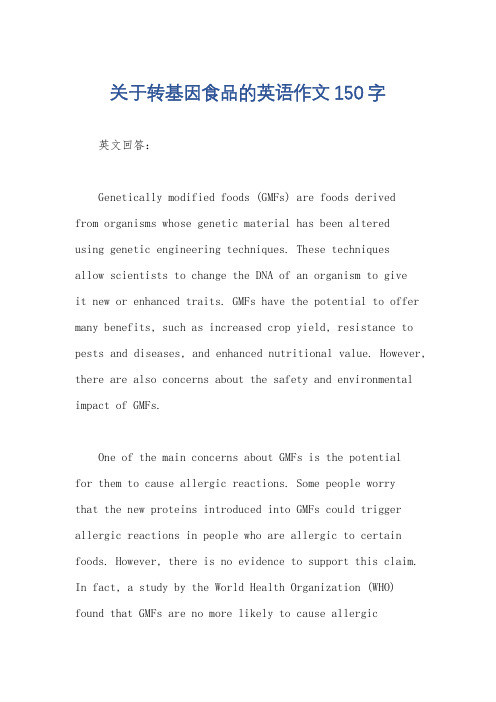
关于转基因食品的英语作文150字英文回答:Genetically modified foods (GMFs) are foods derivedfrom organisms whose genetic material has been alteredusing genetic engineering techniques. These techniquesallow scientists to change the DNA of an organism to giveit new or enhanced traits. GMFs have the potential to offer many benefits, such as increased crop yield, resistance to pests and diseases, and enhanced nutritional value. However, there are also concerns about the safety and environmental impact of GMFs.One of the main concerns about GMFs is the potentialfor them to cause allergic reactions. Some people worrythat the new proteins introduced into GMFs could trigger allergic reactions in people who are allergic to certain foods. However, there is no evidence to support this claim. In fact, a study by the World Health Organization (WHO) found that GMFs are no more likely to cause allergicreactions than conventional foods.Another concern about GMFs is the potential for them to harm the environment. Some people worry that GMFs could escape into the environment and cross-pollinate with wild plants, creating new superweeds that are resistant to herbicides. However, there is no evidence to support this claim. In fact, a study by the National Academy of Sciences found that GMFs are not more likely to escape into the environment than conventional crops.Overall, the evidence suggests that GMFs are safe for human consumption and the environment. However, more research is needed to address the concerns that people have about them.中文回答:转基因食品是指利用基因工程技术改变了其遗传物质的生物所产生的食品。
转基因食品介绍(英语课演讲)
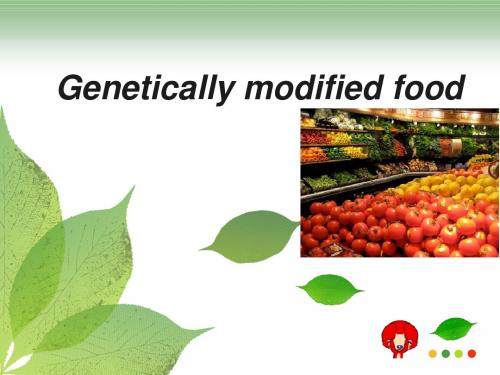
By embedding human's auxin(生长素) gene in a pig's genome(基因组;染色体 组), the growth rate of pig will double,and the quality of pork raise higher than normal one.
2.Special immune value By embedding(嵌入) special anti-cancer gene in plants and making it expressed,the plants will become a vaccine against corresponding(相应的) disease.
The 3rd kind GMF
The 4th kind GMF
Genetically modified special food The scientists use biological genetic engineering to transforme fruits, vegetables , grain and other crops into “vaccine food(疫苗食物)" that can prevent disease.
4.Improing food quality
it is difficult to keep the fruit too long,the genetic engineering,for one,makes it possible to extend storage time,for another,increase the drought(抗旱) resistance of plants in some areas that is out of water supply.
英语作文 转基因食品

Genetically Modified Foods GM Foods have been a topic of heated debate for many years.Here is a detailed look at the subject,covering various aspects of GM foods, including their advantages,disadvantages,and the ongoing controversy surrounding them.Introduction to Genetically Modified Foods:Genetically Modified Foods are products derived from organisms whose genetic material DNA has been altered in a way that does not occur naturally through mating or natural recombination.The technology is used to create plants that are resistant to pests,diseases, and harsh weather conditions,as well as to enhance nutritional content.Advantages of GM Foods:1.Increased Crop Yields:GM crops can be engineered to be resistant to pests and diseases,which can lead to higher yields and more reliable food production.2.Reduced Use of Pesticides:Pestresistant crops can reduce the need for chemical pesticides,which is beneficial for the environment and human health.3.Enhanced Nutritional Content:Some GM foods are designed to have higher levels of essential nutrients,such as vitamin A in rice Golden Rice,which can help address malnutrition in certain regions.4.Climate Resilience:Genetic modifications can make crops more tolerant to drought, salinity,and extreme temperatures,which is crucial in the face of climate change.Disadvantages of GM Foods:1.Environmental Concerns:There are concerns that GM crops could crossbreed with wild plants,leading to the spread of modified genes in the environment.2.Potential Health Risks:Some critics argue that the longterm effects of consuming GM foods on human health are not fully understood and could pose risks.3.Economic Impact on Farmers:The reliance on GM seeds can lead to increased costs for farmers due to the need to purchase seeds annually and the potential for reduced biodiversity in farming practices.4.Ethical Considerations:There are ethical questions about the manipulation of nature at the genetic level and the potential for unintended consequences.The Controversy Surrounding GM Foods:The debate over GM foods is complex and involves scientific,ethical,and economic considerations.Supporters argue that the technology can help feed a growing global population and improve food security.Opponents,however,worry about the potential environmental and health risks and the concentration of power in the hands of a few large biotechnology companies.Regulation and Labeling:Different countries have different regulations regarding GM foods.Some require labeling of GM products,while others have banned or restricted their cultivation and sale.The debate over labeling is also contentious,with some arguing that consumers have a right to know what is in their food,while others believe that mandatory labeling could stigmatize GM foods unnecessarily.Future Prospects:As the worlds population continues to grow,the role of GM foods in global food security is likely to become increasingly important.Advances in genetic engineering,such as CRISPR technology,may offer new opportunities for creating crops that are more resilient and nutritious.However,public trust and acceptance will be crucial for the widespread adoption of these technologies.Conclusion:The discussion around GM foods is multifaceted,involving scientific innovation,ethical considerations,and public health.While there are clear benefits to the technology,such as increased yields and enhanced nutrition,there are also legitimate concerns that need to be addressed through rigorous research,transparent regulation,and open dialogue with the public.As we move forward,it is essential to balance the potential of GM foods with the need to protect our environment and ensure the health and wellbeing of all people.。
转基因食物英语作文
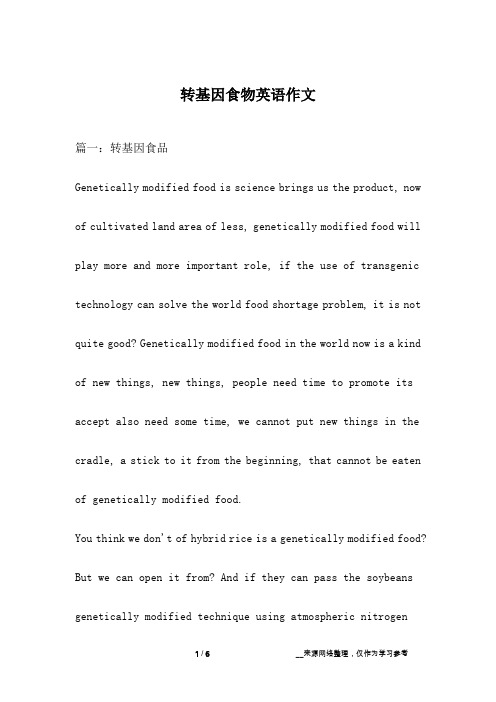
转基因食物英语作文篇一:转基因食品Genetically modified food is science brings us the product, now of cultivated land area of less, genetically modified food will play more and more important role, if the use of transgenic technology can solve the world food shortage problem, it is not quite good? Genetically modified food in the world now is a kind of new things, new things, people need time to promote its accept also need some time, we cannot put new things in the cradle, a stick to it from the beginning, that cannot be eaten of genetically modified food.You think we don't of hybrid rice is a genetically modified food? But we can open it from? And if they can pass the soybeans genetically modified technique using atmospheric nitrogeninside his produces fertilizers to other crops gene transfer in the mankind, it is. Everything is both sides, especially technology, science and technology is a double-edged sword? Genetically modified food has its disadvantages, like some worry, because it will not change, will destroy genetic evolution, etc. Genetically modified food and nutrition inside it isn't like that, the propaganda of people worry is understandable, after accepting a new things take time. But we also should see the benefits of them,I think as time slowly past, genetically modified foods will be accepted by people.篇二:转基因食物With the science and technology expanding day by day,we can get and experience more and more things which have never existed before,such as plane,car and genetically modified food.Theplanes and cars can let us be more convenient in our daily life.However,so far we still do not clearly know all the aspects of genetically modified food.Do they damage to our healthy? So what is the genetically modified food?It is a kind of food that people apply modern molecular biotechnology,transfer some biological gene to other species, transform the genetic material of living things,change the shape, nutritional quality, consumer quality to the target of people's needs.So from the definition of GMF,we can know it happened for people's needs.We can have more options to cook and eat,and it also can save our money because this kind of food is usually cheaper and easier to plant than others.Originally, it is good for our life. While,almost 50 percent of the whole people in China believe that the genetically modified food is not safe to our healthy,but what is the fun thing is most of them don't knowhow the genetically modified food damage their healthy.They just are deeply misunderstanding and even have repellent psychology because of the long-time negative public opinion. Of course,in our country,the new grain law have same more rigorous rules.For example,the genetically modified seeds' scientific research,experiments,productions,sales,imports and exports should be followed to the country's laws,and every individual person and unit are not allowed to imply genetically modified technology at principle grain cultivars without authorization.So in my opinion,we should believe that the genetically modified technology can bring more advantage and less disadvantage to us.It becomes a tendency to eat genetically modified food.So we just be at ease to eat unless the productions are counterfeit and inferior and it is notqualified by the standard department.篇三:转基因食物Today there are 6 billion people on the earth. By the year 2050 there may be 12.5 billion. This is a lot of people to feed. We need more food.One way to produce more food is by growing stronger plants. For thousands of years, farmers have made plants better. Every season, they pick the best plants for the next season. It works very slowly. Since 1983, scientists have been able to change plants more quickly by changing their genetic material(遗传物质). Foods from plants grown in this way are called genetically modified foods(转基因食品), or GM foods.By changing the genetic material of a plant, it is possible to make new plants. They make plants which are strong against plant diseases. They can also help with our diseases: a kind of riceis being prepared(准备), for example, which stops people from becoming blind.Rich countries produce GM foods because they are easy to grow and bring in more money. Poor countries are interested in them because they help produce more food.GM plants are not natural. No one knows how good or bad they are. Making GM foods is only one way of feeding people in 2050. There are strong feelings against them, because they are unnatural. They may feed people, then hurt them or their children later. But, both rich and poor countries are very interested in their use, and they are not going to go away. In 2050 We may think differently about them.。
转基因食品的危害英语作文

转基因食品的危害英语作文英文回答:Genetically modified foods (GMFs) have become a staple in our modern food system, promising increased crop yields, reduced pesticide use, and enhanced nutritional value. However, concerns persist regarding their potential risks to human health and the environment.Health Concerns。
One primary concern is the possibility of allergic reactions or toxic effects from consuming GMFs. Critics argue that genetic modifications could introduce foreign proteins into food products that may trigger allergies or intolerances in susceptible individuals. Studies have reported allergic reactions to soy and corn that have been genetically modified to express proteins from other organisms.Another concern is the potential for antibiotic resistance transfer. Many GMFs are developed usingantibiotic-resistant genes as markers to facilitate gene selection. There are fears that these genes could transfer to bacteria in the human gut, making infections more difficult to treat.Environmental Concerns。
转基因食物 英语作文

转基因食物英语作文Genetically Modified Foods。
Genetically modified foods, or GMOs, are foods that have been altered in some way through genetic engineering. This process involves taking genes from one organism and inserting them into another in order to give it certain desirable traits, such as resistance to pests or a longer shelf life.While GMOs have been around for several decades, they have become increasingly controversial in recent years. Some people argue that they offer many benefits, such as increased crop yields and reduced pesticide use. Others, however, are concerned about the potential risks to human health and the environment.One of the main concerns about GMOs is that they may have unintended consequences. For example, there is some evidence that they may cause allergic reactions in somepeople. Additionally, some studies have suggested that they may harm beneficial insects, such as bees, which arecrucial for pollination.Another concern is that GMOs may have negative effects on the environment. For example, they may lead to the development of superweeds or superbugs that are resistant to pesticides. This can lead to increased pesticide use, which can harm both the environment and human health.Despite these concerns, many people still support the use of GMOs. They argue that they offer many benefits, such as increased crop yields and reduced pesticide use. Additionally, they argue that the risks of GMOs are relatively low and that they are rigorously tested before being approved for use.In conclusion, genetically modified foods are a controversial topic that has divided many people. While some argue that they offer many benefits, others are concerned about the potential risks to human health and theenvironment. Ultimately, it is up to each individual to decide whether or not they want to consume GMOs.。
转基因报告英语作文

转基因报告英语作文In recent years, the topic of genetically modified (GM) foods has sparked intense debate and controversy. The development of GM technology has the potential to revolutionize agriculture, offering solutions to some of the world's most pressing issues such as food scarcity and malnutrition. However, there are also significant concerns about the safety and ethical implications of this technology.Advantages of Genetically Modified Foods1. Increased Crop Yields: GM crops are engineered to be more resistant to pests and diseases, which can lead to higher yields. This is particularly beneficial in regions where traditional farming methods struggle to produce enough food to feed the population.2. Enhanced Nutritional Content: Genetic modification can be used to enhance the nutritional value of crops. For example, the development of 'Golden Rice' which is fortified with vitamin A has the potential to combat vitamin A deficiency in developing countries.3. Reduced Environmental Impact: GM crops can be designed to require less water and fewer chemical inputs, such as pesticides and fertilizers. This can lead to a reduction in the environmental footprint of agriculture.Concerns About Genetically Modified Foods1. Health Risks: There is ongoing debate about the long-term health effects of consuming GM foods. Some studies suggest that they may have unforeseen consequences on human health.2. Ecological Concerns: The introduction of GM crops into the environment could potentially lead to unforeseen ecological disruptions. For instance, cross-pollination with wild plants could lead to the spread of modified genes into the wild.3. Ethical Issues: The patenting of GM seeds by large corporations raises ethical concerns about who controls the world's food supply. Critics argue that this could lead to a monopolization of the seed market, disadvantaging small farmers.ConclusionThe debate surrounding GM foods is complex and multifaceted. While the technology offers potential benefits such as increased yields and enhanced nutrition, it also raises important questions about safety, environmental impact, and ethical considerations. It is crucial for scientists, policymakers, and the public to engage in open and informed discussions to ensure that the development and use of GM technology is guided by a clear understanding of its implications.In conclusion, the future of GM foods will likely be shaped by a balance between the pursuit of scientific innovation andthe need to address societal concerns. As we move forward, it is essential to approach this technology with both caution and curiosity, striving for a sustainable and equitable solution to global food challenges.。
英语作文转基因食品

英语作文转基因食品英文回答:Genetically modified foods (GMFs) have become a controversial topic in recent years, with strong opinions on both sides of the debate. Some people believe that GMFs are safe and beneficial, while others worry about their potential risks to health and the environment.There are a number of potential benefits to GMFs. For example, they can be modified to resist pests and diseases, which can reduce the need for pesticides and herbicides. This can save farmers money and help to protect the environment. GMFs can also be modified to improve their nutritional value, making them a healthier option for consumers.However, there are also some potential risks associated with GMFs. One concern is that they could cause allergic reactions in some people. Another concern is that theycould transfer their modified genes to other plants or animals, potentially creating new superweeds or pests.The debate over GMFs is likely to continue for many years to come. There is no easy answer to the question of whether or not they are safe and beneficial. Ultimately, the decision of whether or not to eat GMFs is a personal one.中文回答:转基因食品(GMF)近年来已成为一个有争议的话题,双方都有强烈的意见。
转基因食物作文英文

转基因食物作文英文英文:Genetically modified foods, also known as GMOs, have been a controversial topic for many years. On one hand, supporters argue that GMOs can increase crop yields, reduce the use of pesticides, and even enhance the nutritional value of food. However, opponents of GMOs argue that they can have negative effects on human health and the environment.Personally, I am wary of GMOs. While the potential benefits are intriguing, I am concerned about the long-term effects on both our health and the environment. For example, some studies have suggested that GMOs can lead to the development of antibiotic-resistant bacteria, which could have serious consequences for public health. Additionally, the use of GMOs can lead to the loss of biodiversity andthe creation of "superweeds" that are resistant to herbicides.Furthermore, I believe that consumers have the right to know whether their food contains GMOs. In many countries, including the United States, there is no requirement for food manufacturers to label their products as containing GMOs. This lack of transparency is concerning, as it makesit difficult for consumers to make informed choices aboutthe food they eat.Overall, while GMOs may have some potential benefits, I believe that we need to proceed with caution and prioritize the long-term health of both humans and the environment.中文:转基因食物,也称为GMO,多年来一直是一个备受争议的话题。
英语作文转基因食品
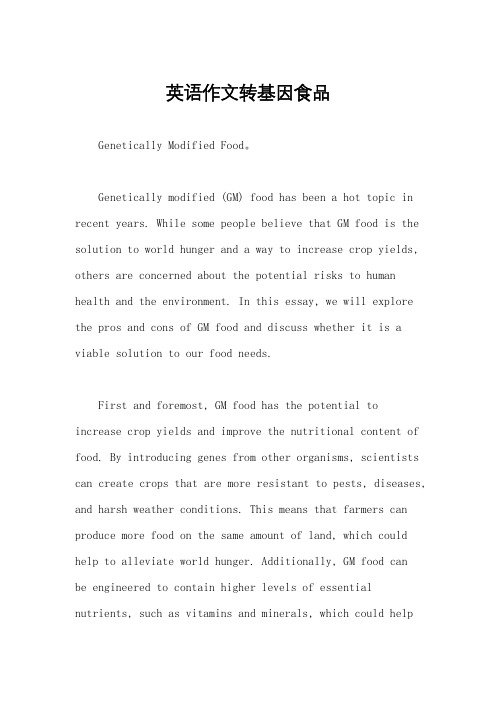
英语作文转基因食品Genetically Modified Food。
Genetically modified (GM) food has been a hot topic in recent years. While some people believe that GM food is the solution to world hunger and a way to increase crop yields, others are concerned about the potential risks to human health and the environment. In this essay, we will explore the pros and cons of GM food and discuss whether it is a viable solution to our food needs.First and foremost, GM food has the potential to increase crop yields and improve the nutritional content of food. By introducing genes from other organisms, scientists can create crops that are more resistant to pests, diseases, and harsh weather conditions. This means that farmers can produce more food on the same amount of land, which could help to alleviate world hunger. Additionally, GM food canbe engineered to contain higher levels of essential nutrients, such as vitamins and minerals, which could helpto improve the overall health of the population.On the other hand, there are concerns about thepotential risks of GM food to human health and the environment. Some studies have suggested that consuming GM food could have negative effects on human health, such as allergies and antibiotic resistance. Additionally, thereare worries about the impact of GM crops on the environment, such as the potential for cross-breeding with wild plants and the development of superweeds that are resistant to herbicides. These concerns have led to calls for more stringent regulation of GM food and for more research into its long-term effects.Despite these concerns, many experts believe that GM food has the potential to play a key role in addressing our future food needs. With the global population expected to reach 9 billion by 2050, there will be increasing pressure on the world's food supply. GM food could help to meet this demand by increasing crop yields and improving thenutritional content of food. However, it is important that we proceed with caution and ensure that GM food isthoroughly tested for its safety and environmental impact before it is widely adopted.In conclusion, GM food is a complex and controversial issue. While it has the potential to increase crop yields and improve the nutritional content of food, there are concerns about its potential risks to human health and the environment. As we move forward, it is important that we carefully consider the pros and cons of GM food and ensure that it is thoroughly tested and regulated before it is widely adopted. Only then can we be confident that GM food is a viable solution to our future food needs.。
转基因食品英语作文200
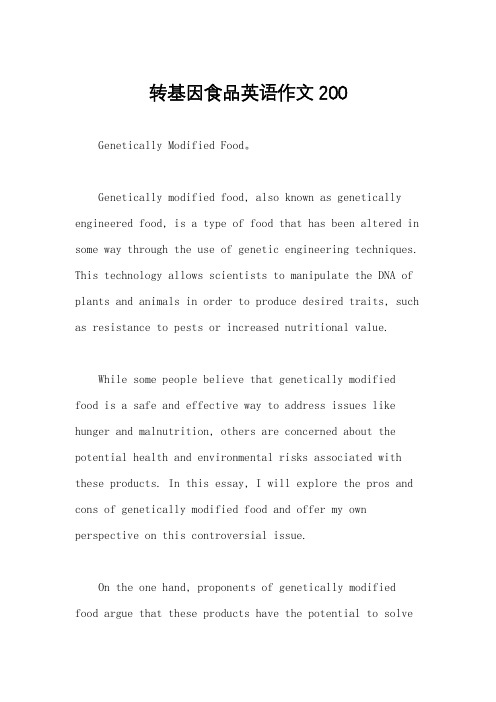
转基因食品英语作文200Genetically Modified Food。
Genetically modified food, also known as genetically engineered food, is a type of food that has been altered in some way through the use of genetic engineering techniques. This technology allows scientists to manipulate the DNA of plants and animals in order to produce desired traits, such as resistance to pests or increased nutritional value.While some people believe that genetically modified food is a safe and effective way to address issues like hunger and malnutrition, others are concerned about the potential health and environmental risks associated with these products. In this essay, I will explore the pros and cons of genetically modified food and offer my own perspective on this controversial issue.On the one hand, proponents of genetically modified food argue that these products have the potential to solvesome of the world's most pressing food-related problems.For example, genetically modified crops can be designed to resist pests and diseases, which can reduce the need for harmful pesticides and herbicides. In addition, scientists can use genetic engineering to increase the nutritional value of food, which could help to address malnutrition in developing countries.Another potential benefit of genetically modified foodis that it could help to increase crop yields, which would be particularly important in areas with limited arable land. By making crops more resistant to drought, for example, farmers could produce more food with less water, whichwould be especially important in regions that are prone to drought or other climate-related challenges.Despite these potential benefits, however, there are also a number of concerns about the safety andenvironmental impact of genetically modified food. For example, some studies have suggested that genetically modified crops could have negative effects on human health, such as causing allergic reactions or contributing to thedevelopment of antibiotic-resistant bacteria.In addition, there are concerns about the potential environmental impact of genetically modified crops. For example, some critics argue that these crops could crossbreed with wild plants, creating "superweeds" that are resistant to herbicides and difficult to control. Others worry that genetically modified crops could harm beneficial insects, such as bees, which are essential for pollination.Given these concerns, it is clear that more research is needed to fully understand the potential risks and benefits of genetically modified food. In the meantime, however, it is important for consumers to be aware of the potential risks associated with these products and to make informed decisions about the food they eat.In my opinion, while genetically modified food may have some potential benefits, the risks associated with these products are simply too great to justify their widespread use. Until more research is conducted to fully understand the potential health and environmental risks of geneticallymodified food, I believe it is best to err on the side of caution and avoid these products whenever possible.。
转基因食品 英语作文
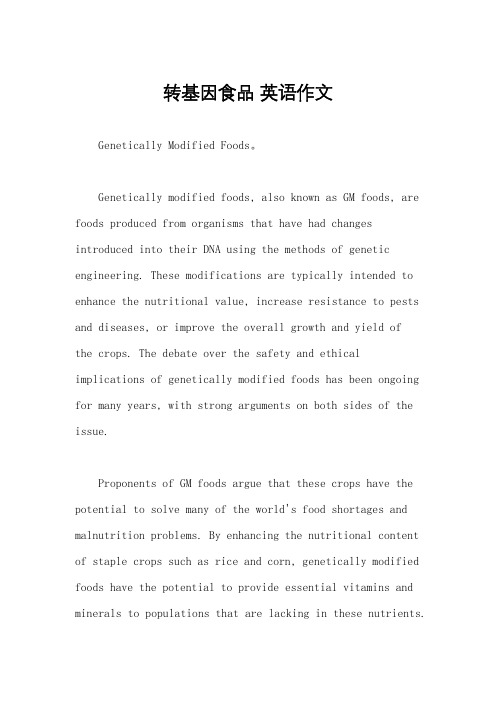
转基因食品英语作文Genetically Modified Foods。
Genetically modified foods, also known as GM foods, are foods produced from organisms that have had changes introduced into their DNA using the methods of genetic engineering. These modifications are typically intended to enhance the nutritional value, increase resistance to pests and diseases, or improve the overall growth and yield ofthe crops. The debate over the safety and ethical implications of genetically modified foods has been ongoing for many years, with strong arguments on both sides of the issue.Proponents of GM foods argue that these crops have the potential to solve many of the world's food shortages and malnutrition problems. By enhancing the nutritional content of staple crops such as rice and corn, genetically modified foods have the potential to provide essential vitamins and minerals to populations that are lacking in these nutrients.Additionally, the increased resistance to pests and diseases can result in higher crop yields, leading to more efficient and sustainable agricultural practices.Furthermore, supporters of GM foods point to the environmental benefits of these crops. By reducing the need for chemical pesticides and herbicides, genetically modified foods can have a lower impact on the environment and reduce the exposure of farmers to potentially harmful chemicals. Additionally, the increased yield of GM crops can reduce the amount of land needed for agriculture, potentially preserving natural habitats and biodiversity.On the other hand, critics of genetically modified foods raise concerns about the potential health risks and ethical implications of these crops. There is a lack of long-term studies on the effects of consuming genetically modified foods, leading to uncertainty about their safety for human consumption. Additionally, there are concerns about the potential for unintended consequences, such as the development of resistance in pests and the creation of "superweeds" that are resistant to herbicides.Ethically, there are concerns about the control of the food supply by a few large corporations that produce genetically modified seeds. The patenting of these seeds can lead to increased costs for farmers and reduce the availability of traditional, non-modified seeds. Furthermore, there are worries about the potential for genetic contamination of non-GM crops, leading to the loss of biodiversity and the potential for irreversible changes to natural ecosystems.In conclusion, the debate over genetically modified foods is complex and multifaceted, with strong arguments on both sides of the issue. While proponents of GM foods point to their potential to alleviate food shortages and improve agricultural practices, critics raise concerns about the potential health risks and ethical implications of these crops. As the technology and understanding of genetic engineering continue to advance, it is essential to carefully consider the benefits and drawbacks ofgenetically modified foods and make informed decisions about their use and regulation.。
转基因食品的危害英语作文

转基因食品的危害英语作文英文回答:Genetically modified foods (GMFs) are organisms whose genetic material has been altered using genetic engineering techniques. These techniques allow scientists to change the DNA of an organism in a way that was not possible through traditional breeding methods.Several potential hazards are associated with GMFs:1. Allergenicity: GMFs may introduce new allergens into the food supply. For example, a gene from a Brazil nut could be inserted into soybeans, potentially causing allergic reactions in people who are allergic to Brazil nuts.2. Toxicity: Some GMFs may produce toxins that are harmful to human health. For example, a gene from a bacterium was inserted into potatoes to make them resistantto the Colorado potato beetle, but the resulting potatoes were also found to produce a toxin that was harmful to rats.3. Antibiotic resistance: Some GMFs contain genes that confer antibiotic resistance. This could make it moredifficult to treat bacterial infections in humans and animals.4. Environmental impact: GMFs may have unintended consequences on the environment. For example, a gene from a herbicide-resistant plant could be transferred to weeds, making them more difficult to control.5. Unknown long-term effects: The long-term effects of eating GMFs are not fully known. Some scientists are concerned that eating GMFs could lead to health problemsthat may not become apparent for many years.中文回答:转基因食品的危害。
转基因食物英文作文

转基因食物英文作文英文:Genetically modified food, or GMO food, has been a controversial topic for years. On one hand, proponents argue that GMOs can help increase crop yields, reduce pesticide use, and improve the nutritional content of food. On the other hand, opponents argue that GMOs can have negative effects on the environment, human health, and the economy.Personally, I am wary of GMOs. While I acknowledge that they may have some benefits, I believe that the potential risks outweigh them. For example, GMOs could potentially crossbreed with wild plants, creating new species that could be harmful to the environment. Additionally, there have been concerns about the long-term effects of consuming GMOs on human health.Furthermore, I believe that consumers have the right toknow what is in their food and how it was produced. Many countries, including the United States, do not require GMO labeling, which makes it difficult for consumers to make informed decisions about what they eat.In contrast, there are those who argue that GMOs are necessary to feed the world's growing population. They argue that GMOs can help increase crop yields and make food more affordable. While I understand this viewpoint, I believe that there are other ways to address foodinsecurity that do not involve GMOs.Overall, I believe that we need to approach GMOs with caution and prioritize transparency and consumer choice.中文:转基因食物,或称为GMO食品,多年来一直是一个有争议的话题。
转基因食品的利弊英语作文

转基因食品的利弊英语作文Genetically modified foods (GMFs) have been a topic of heated debate for many years. They are created by altering the genetic makeup of organisms to exhibit certain desirable traits. Here, we will explore the advantages and disadvantages of GMFs.Advantages of Genetically Modified Foods:1. Increased Yield: GM crops are often engineered to be more resistant to pests and diseases, which can lead to higher yields and more food production.2. Improved Nutrition: Some GMFs are designed to have enhanced nutritional content, such as rice fortified with vitamin A, which can help combat malnutrition in developing countries.3. Pest Resistance: Genetic modification can make crops resistant to common pests, reducing the need for chemical pesticides and the associated environmental damage.4. Herbicide Tolerance: GM crops can be engineered to withstand certain herbicides, allowing farmers to control weeds without harming the crop.5. Climate Resilience: Genetic modifications can make plants more tolerant to harsh conditions, such as drought or extremetemperatures, which is crucial in the face of climate change.Disadvantages of Genetically Modified Foods:1. Health Concerns: There are concerns that GMFs may have unforeseen effects on human health, although extensive research has not yet found conclusive evidence.2. Environmental Impact: The use of herbicide-tolerant crops can lead to an increase in herbicide use, potentially harming non-target organisms and ecosystems.3. Loss of Biodiversity: The widespread adoption of GM crops can lead to a reduction in agricultural biodiversity, as traditional crop varieties are replaced.4. Economic Issues: GM seeds are often patented, which can lead to increased costs for farmers and a dependence on seed companies.5. Ethical Considerations: Some people have ethical objections to the manipulation of an organism's genetic code, viewing it as "playing God."In conclusion, genetically modified foods offer potential benefits such as increased food security and improved nutrition. However, they also come with risks that need to be carefully managed. It is essential for ongoing research and regulation to ensure that the benefits of GMFs can berealized while minimizing their potential drawbacks.。
关于转基因食品的英语作文150字
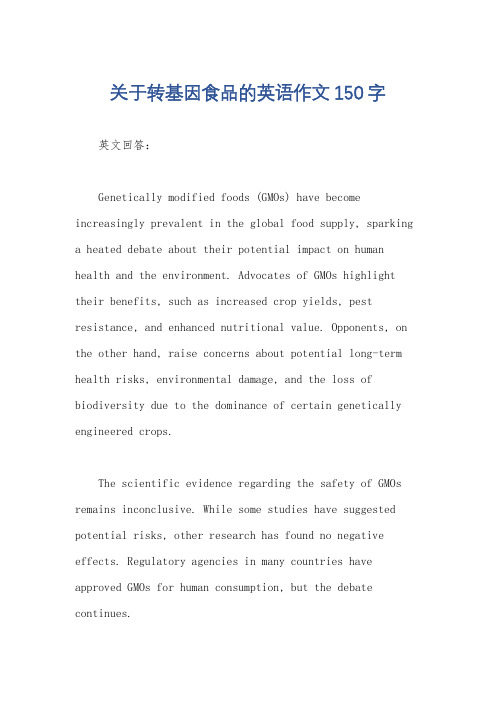
关于转基因食品的英语作文150字英文回答:Genetically modified foods (GMOs) have become increasingly prevalent in the global food supply, sparking a heated debate about their potential impact on human health and the environment. Advocates of GMOs highlight their benefits, such as increased crop yields, pest resistance, and enhanced nutritional value. Opponents, on the other hand, raise concerns about potential long-term health risks, environmental damage, and the loss of biodiversity due to the dominance of certain genetically engineered crops.The scientific evidence regarding the safety of GMOs remains inconclusive. While some studies have suggested potential risks, other research has found no negative effects. Regulatory agencies in many countries have approved GMOs for human consumption, but the debate continues.One of the primary concerns associated with GMOs is their potential impact on human health. Some critics argue that genetically engineered foods may contain allergens, toxins, or other harmful substances that could cause adverse health effects. However, rigorous scientific studies have not yet provided consistent evidence to support these claims.Another concern raised by opponents of GMOs is their impact on the environment. The widespread use ofgenetically modified crops could lead to the development of herbicide-resistant weeds, harming the biodiversity of natural ecosystems. Additionally, the transfer of genetically modified genes to non-target species, such as insects or wild plants, could have unforeseen consequences for the genetic diversity of the food chain.Despite these concerns, GMOs also present potential benefits. Increased crop yields could help feed a growing global population, while pest resistance can reduce the need for chemical pesticides. Moreover, geneticallymodified crops can be engineered to contain enhanced nutritional value, helping to address malnutrition in certain regions.The debate surrounding GMOs is complex, with both pros and cons to consider. While scientific research continues to evaluate their safety and potential risks, it is crucial to approach this issue with a balanced perspective, weighing the potential risks and benefits to make informed decisions.中文回答:转基因食品(GMOs)在全球粮食供应中的比重越来越大,引发了关于它们对人类健康和环境潜在影响的激烈争论。
转基因食品的英语作文
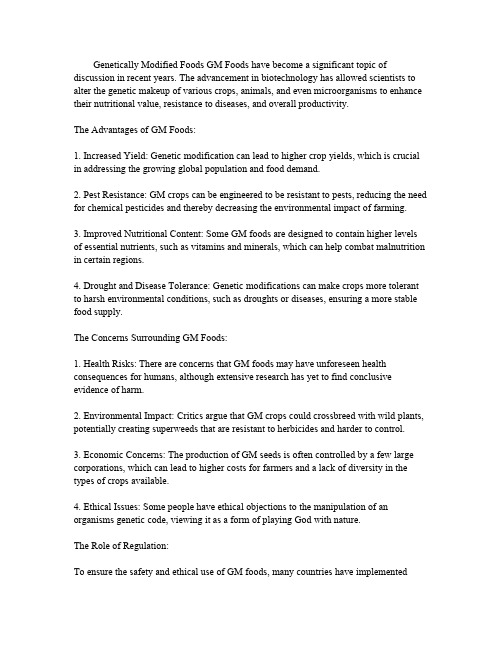
Genetically Modified Foods GM Foods have become a significant topic of discussion in recent years.The advancement in biotechnology has allowed scientists to alter the genetic makeup of various crops,animals,and even microorganisms to enhance their nutritional value,resistance to diseases,and overall productivity.The Advantages of GM Foods:1.Increased Yield:Genetic modification can lead to higher crop yields,which is crucial in addressing the growing global population and food demand.2.Pest Resistance:GM crops can be engineered to be resistant to pests,reducing the need for chemical pesticides and thereby decreasing the environmental impact of farming.3.Improved Nutritional Content:Some GM foods are designed to contain higher levels of essential nutrients,such as vitamins and minerals,which can help combat malnutrition in certain regions.4.Drought and Disease Tolerance:Genetic modifications can make crops more tolerant to harsh environmental conditions,such as droughts or diseases,ensuring a more stable food supply.The Concerns Surrounding GM Foods:1.Health Risks:There are concerns that GM foods may have unforeseen health consequences for humans,although extensive research has yet to find conclusive evidence of harm.2.Environmental Impact:Critics argue that GM crops could crossbreed with wild plants, potentially creating superweeds that are resistant to herbicides and harder to control.3.Economic Concerns:The production of GM seeds is often controlled by a few large corporations,which can lead to higher costs for farmers and a lack of diversity in the types of crops available.4.Ethical Issues:Some people have ethical objections to the manipulation of an organisms genetic code,viewing it as a form of playing God with nature.The Role of Regulation:To ensure the safety and ethical use of GM foods,many countries have implementedstrict regulations.These regulations include thorough testing and labeling requirements to inform consumers about the presence of genetically modified ingredients in food products.The Future of GM Foods:As technology continues to evolve,so too does the potential for GM foods to address global food security and nutritional challenges.However,it is essential to balance this potential with a careful consideration of the environmental,health,and ethical implications.In conclusion,genetically modified foods offer both opportunities and challenges.While they hold the promise of increased food production and improved nutrition,it is crucial to approach their development and use with caution,ensuring that they are safe for both humans and the environment.The ongoing dialogue between scientists,policymakers, and the public will be vital in shaping the future of GM foods.。
- 1、下载文档前请自行甄别文档内容的完整性,平台不提供额外的编辑、内容补充、找答案等附加服务。
- 2、"仅部分预览"的文档,不可在线预览部分如存在完整性等问题,可反馈申请退款(可完整预览的文档不适用该条件!)。
- 3、如文档侵犯您的权益,请联系客服反馈,我们会尽快为您处理(人工客服工作时间:9:00-18:30)。
Widely planted
forbid
confused
America Canada Argentina
阿根廷
Most European counreies
China and many other countries
Company Logo
Situation in the world
对抗生素的抵抗作用
当科学家把一个外来基因加入到植物或细菌中去, 这个基因会与别的基因连接在一起。人们在服用了这 种改良食物后,食物会在人体内将抗药性基因传给致 病的细菌,使人体产生抗药性。
Present Situation and Future Development
GM food in world
多产的
产量
GM crops can be made resistant to pests害虫 ↓ Saves the use of toxic chemicals有毒化肥 ↓ More environment friendly because they require less herbicides and pesticides.
Wewant should beup careful about GMF; I also to call a group of young volunteers to eat this strain ofGMF rice –in who We should recognize a will take a riskway for human’s development. science and treat different GM foods in different ways.
Company Logo
Shelves stacked with GM foods
But…
Can every common person tell which ones are natural and which are GM products?
Company Logo
• Agricultural(农业)value
• medicinal value • Ecological(生态) value
• edibleness 食用价值
• Economic(经济)value
grow faster than the GM crops → traditionally grown crops ↙ ↘ more productive a larger yield
杀虫剂
• GMF Offers more nutritional(营养) value and better flavor . Eg. Vitamin A
Economic value
Reduce extra costs, such as buying chemicals and pesticides(农药).
Distributions
Recently, China issued Certificates for genetically modified rice‘Huahui
number one’
and ‘Bt Shanyou 63’.
我国最近为转基因抗虫水 稻“华恢1号”和“Bt汕 优63”发放了安全证书。
过敏反应问题
对于一种食物过敏的人,有时还会对一种以前他们 不过敏的食物产生过敏,比如:科学家将玉米的某一 段基因加入到核桃、小麦和贝类动物的基因中,蛋白 质也随基因加了进去,那么,以前吃玉米过敏的人就 可能对这些核桃、小麦和贝类食品过敏。
Resistance to antibiotics
When the scientists a foreign gene into the plant or bacteria, this gene and other genes connected together. People after using the improved food, food will be in the human body resistance genes to pathogenic bacteria, make human body resistance.
Potential danger of GMF
Toxicity problem
Some researchers believe that for artificial refining and added genes, be achieved in some people want to achieve the effect of at the same time, also increase and accumulate the original traces of poison in the food.
I’m ready tobe take a risk for science. GMF,can’t denied or I will be one of the people who eat believed withoutmodified experiments. genetically rice .
Genetically
Modified
Food
初三(20)班 邵尧
(GMF)
genetically modified food
GMF
For example, genes from a fish have been placed in strawberries and tomatoes.
a plant, animal, or microorganism that is created by means that overcome natural boundaries. Genetic engineering involves crossing species that could not breed in nature.
毒性问题
一些研究学者认为,对于基因的人工提炼和添加, 可能在达到某些人们想达到的效果的同时,也增加和 积聚了食物中原有的微量毒素。
Allergy problem
For a food allergy sometimes food allergic to a previously they do not produce allergic, such as: the scientists added a gene of corn to the walnut, wheat, and shellfish gene, protein is added with gene, so, before eat corn can people who are allergic to the nuts, wheat, and shellfish food allergies.
